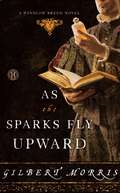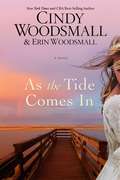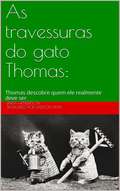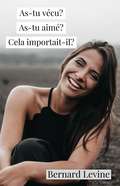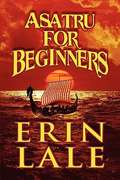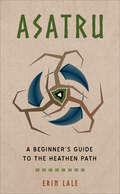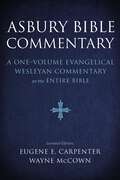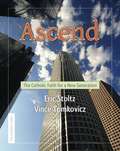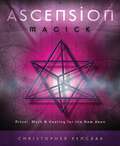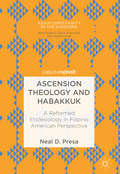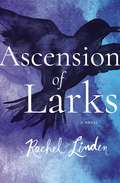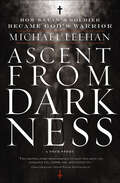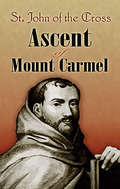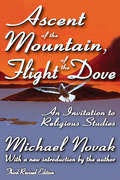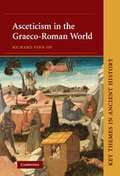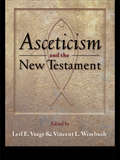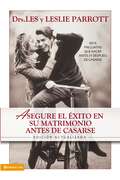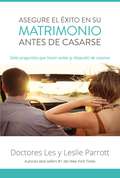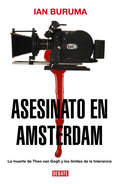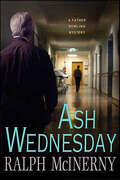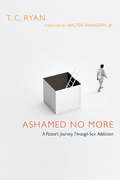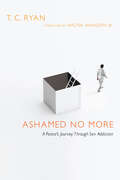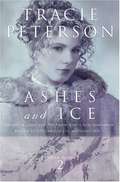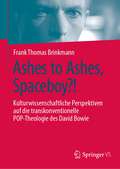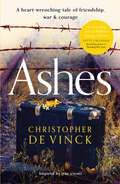- Table View
- List View
As the Sparks Fly Upward (Winslow Breed #3)
by Gilbert MorrisThe trilogy The Winslow Breed serves as a prequel to the author's highly successful House of Winslow series (published by Bethany House). As the Sparks Fly Upward is the final book in the trilogy.Young Colin Winslow grows up feeling altogether different from the rest of his family. Not bold and rough like his charismatic brother, Adam, or headstrong and spoiled like his sister, Adara, he is a gentle soul with a special love for natural things. His interest in animals, medicine, and healing brings him in contact with a strange woman who lives in the woods, Meg Caradoc. She teaches him the fine art of using a variety of herbs to quell sickness and pain.When Colin studies at Oxford, an eccentric but brilliant professor, Dr. Phineas Teague, guides the young man to a career in medicine. The formal knowledge Professor Teague imparts, combined with knowledge of Meg's herbal remedies, make Colin an insightful and successful doctor--one with the approving eye of Queen Elizabeth on him. Colin's skill quickly earns him many patients, some highly placed in the courts of both his queen and her sister Mary Queen of Scots. This once shy and uncertain young man finds himself in the midst of court intrigue and a key player in quelling assassination plots and passing vital information to the queen's court. When Colin faces his most difficult case--curing the wounds his brave brother suffered in battle--he must confront his attraction to Adam's wife, his unsteady faith in God, and his command of medicine: will he abandon his noble role and succumb to temptation, or will he take his place as the new hero of the Breed of Winslow?
As the Tide Comes In: A Novel
by Cindy Woodsmall Erin WoodsmallA New York Times best-selling author releases her first southern novel, a Steel Magnolias-meets-Sweet Home Alabama story set on St. Simons Island.When an unthinkable loss sends Tara Abbott's life spiraling out of control, she journeys from North Carolina to Georgia's St. Simons Island. Although confused and scared, she hopes to find answers about her past - her life before the years of foster care and raising her two half-brothers as a young adult. Will she find steady ground on the island, surrounded by an eccentric-but-kindhearted group of older women called The Glynn Girls and a determined firefighter? Or will the truth splinter what's left of her identity into pieces?
As travessuras do gato Thomas: Thomas descobre quem ele realmente deve ser
by Linda HendersonThomas, o adorável felino, faz uma excursão pelo bairro e fica surpreso com o que descobre. Ele encontra um cachorro collie, um cordeiro, um falcão, uma égua branca, um tigre, um leão, uma família de elefantes e uma coruja. Mas porque ele não percebe que é realmente um gato, cada encontro o faz pensar se esse é o tipo de animal que ele deveria ser. Finalmente, uma coruja sábia revela a verdade para ele. Seus filhos vão se deliciar com a nova aventura de Thomas e começar a refletir junto com Thomas, quem eles também deveriam ser quando crescerem!
As-tu vécu? As-tu aimé? Cela importait-il?
by Bernard LevineIl y a une histoire qui dit que chaque matin, Dieu envoie deux anges du ciel pour venir nous rendre visite. Qui sont ces anges? Rencontrons-les… Le nom du premier ange est «Demandez»… et le nom du deuxième ange est «Louange». Ces deux anges portent des paniers. Lorsque nous regardons ce qui est à l'intérieur du panier du premier ange, nous constatons que le panier est plein, jusqu'en haut, débordant de nos demandes de prière à Dieu telles que `` donnez-moi une grande maison, je veux une nouvelle voiture, obtenez-moi un meilleur travail et je veux beaucoup d'argent. Maintenant, quand nous regardons pour voir ce qui est à l'intérieur du panier du deuxième ange, nous constatons qu'il est vide… ils disent que seulement parfois, juste au fond du panier, il y a un ou deux mots de louange. Pensez à Dieu… chaque jour, Dieu a beaucoup, beaucoup de nos demandes pour répondre de plus en plus à nos «demandes» et «désirs». Serons-nous jamais satisfaits et reconnaissants de ce que nous avons déjà? Dites-moi, avons-nous prié pendant tout ce temps en suppliant Dieu de fournir et pourtant, nous ne prenons presque jamais le temps de remercier Dieu que nous sommes vivants et de le louer pour chaque battement de cœur et chaque souffle. Ne serait-il pas merveilleux de chercher et d'orienter nos prières pour donner la louange et la gloire au «Donneur» d'abord, avant de nous concentrer autant de notre temps de prière sur la recherche des «Cadeaux» et ce que nous pouvons obtenir de la Dieu. Chaque jour, faisons de Dieu notre plaisir… car Dieu est tout ce dont nous avons besoin!
Asatru For Beginners
by Erin LaleThis is an easy-to-read introduction to the heathen religion Asatru. The book starts with a list of frequently asked questions. The next chapter is history, which begins with heathen mythology, covers the prehistory of ancient Europe, the history of barbarian contact with Rome, and continues with the history of heathenism up to the present day. The next two chapters are handy lists of gods and other beings. Then comes the section on rituals, including holiday celebrations, toasting rituals, weddings and other life events. The chapter on beliefs and morality explains the heathen world view and answers specific questions on how Asatru relates to the modern world. The chapter on magic introduces runes, seidh, spells, and bersarkrgangr. Finally, the resources chapter lists recommendations for further study and contact information for the major Asatru organizations in America. Whether or not you're a beginner, you'll find excellent knowledge here.
Asatru: A Beginner's Guide to the Heathen Path
by Erin LaleAn introduction to the history, beliefs, rituals and deities of this popular Neo-Pagan belief drawn from ancient northern European traditions. Asatru is a modern Pagan tradition whose roots lie in the ancient myths, folklore, sagas, and historical artifacts of those who lived in pre-Christian times in what is now Iceland, Scandinavia, Scotland, Germany, and other parts of northern Europe. It is also one of the fastest growing religions in the United States and Europe. A clear and accessible introduction to this heathen religion, this book covers all the basics and answers the essential questions about Asatru. Key topics include: A brief exploration of Asatru&’s mythology The role of Asatru&’s gods and goddesses, rituals, magical practices of divination, spells, and berserkgangr (a form of trance magic) The moral virtues of Asatru: courage, honor, loyalty, truth, hospitality, industriousness, self-discipline, self-reliance, and steadfastness A look at various interpretations of the Asatru tradition and the &“hijacking&” of its symbolism over the last two centuries Readers new to Asatru and experts alike will find this book to be an invaluable resource in understanding this heathen tradition.
Asbury Bible Commentary: A one–volume evangelical Wesleyan commentary on the entire Bible
by ZondervanA one–volume evangelical Wesleyan commentary on the entire Bible.John Wesley believed the Bible to be the Word of God, and he insisted that Wesleyan teaching conform to that standard. This commentary carefully explains the Bible, book by book, in terms of the intentions of the authors who composed it. At the same time, it is an inspiring exposition of the Bible&’s message for us and the peoples of all times. The work includes introductory articles that reinforce the historic Wesleyan view of the infallibility and authority of the Scriptures.Written by nearly fifty scholars, this work is a collaboration to aid pastors, Sunday school teachers, Bible study leaders, college and seminary students, and others who love the Word of God.
Ascend: The Catholic Faith for a New Generation
by Eric Stoltz Vince TomkoviczAscend: The Catholic Faith for a New Generation is an approachable, clearly written, and contemporary exploration of the Catholic faith aimed at young adults. Precisely with this audience in mind, it is designed with full-color graphics, short chapters, and interesting sidebar articles that cover the basics of Christianity from a viewpoint that is distinctively Catholic yet ecumenical. The format allows the reader to read chapters as time is available, rather than studying a long, linear text. Sidebar stories in each chapter profile a role model and offer a Christian viewpoint on some aspect of current events. The book also serves as an effective gateway to Scripture, guiding the reader to passages that flesh out ideas in the way only Revelation can. Ascend aims to instill in the reader a true personal connection with the person of Jesus Christ and an active appreciation of the reader's role in the Church. Discussion questions and book recommendations are included for each chapter, as well as an extensive glossary. This one-of-a-kind book will certainly fill a need for a relevant, attractive, yet penetrating overview of the faith for young people.
Ascension Magick: Ritual, Myth & Healing for the New Aeon
by Christopher PenczakTaking a magickal approach to this often misunderstood spirituality, Christopher Penczak explores the fascinating path of ascension. Ascension Magick unveils the diverse mystical roots of ascension, and highlights where the beliefs and practices of today's "light workers" intersect with those of modern pagans, witches, and magick practitioners. It also examines the practical side-various forms of magick, energy healing, meditation, past life regression, channeling, dowsing-and provides helpful meditations, spells, and exercises. From angels and aliens to reincarnation and the Merkaba, Penczak leaves no stone unturned in this remarkably thorough and absorbing examination of ascension spirituality and magick.
Ascension Theology and Habakkuk: Reformed Ecclesiology In Filipino American Perspective (Asian Christianity In The Diaspora )
by Neal D. PresaThis book describes Reformed ecclesiology through the lived faith of the Filipino American Christian diaspora. It proposes a contextual, constructive ecclesiology by engaging with the Presbyterian/Reformed theological tradition’s understanding of the ascension of Jesus Christ with the Old Testament book of Habakkuk as a conversation partner.
Ascension of Larks
by Rachel LindenWhen globetrotting photographer Magdalena Henry loses the only man she’s ever loved, she risks her stellar career to care for his widow and young children on a remote island in the Pacific Northwest. Free-spirited and fiercely independent, Maggie adores her life of travel and adventure. But she has a secret. She can’t let go of her first and only love, renowned architect Marco Firelli, now married to her best friend Lena.When Marco drowns in a kayaking accident, Maggie rushes to the Firelli family’s summer home on San Juan Island. Once there she discovers that Marco was hiding something that could destroy his family. As fragile, perfectionistic Lena slowly falls apart, Maggie tries to provide stability for Marco and Lena’s three young children.When Maggie is offered a once-in-a-lifetime chance to compete in the world’s most prestigious photography competition, she thinks she’s found the answer to their problems. Then Lena makes a choice with unexpected and devastating consequences, forcing Maggie to grapple with an agonizing decision. Does she sacrifice the golden opportunity of her career or abandon the Firellis just when they need her the most?Gradually the island begins to work its magic. A century-old ritual to beckon loved ones home offers hope in the midst of sorrow. And a guilt-ridden yet compelling stranger hiding on the island may offer Maggie a second chance at love, but only if she can relinquish the past and move forward to find joy in unexpected places.
Ascent from Darkness: How Satan's Soldier Became God's Warrior
by Michael LeehanHis assignment from Satan was to kill Pastor Craig Groeschel. Today he sits on the front row of that pastor’s church.For twenty years of his life, Michael Leehan lived and worked for Satan. At age 33, he made a decision to serve the darkness that he felt had consumed his life, but instead of making things easier, it began a steeper downward spiral replete with ritualistic cuttings, blood sacrifices, jail time, job loss, estrangement from his friends and family, and actual murderous assignments from Satan himself.Ascent from Darkness relates Michael’s gripping, real-life encounters, enslavement to the powers of darkness, and miraculous emancipation from the clutches of the Enemy.For anyone who has ever struggled with spiritual warfare, addiction, depression, or hopelessness, Michael’s story is a bold reminder of the redemptive truth of the gospel that anyone—even a soldier of Satan—can be transformed and used for the glory of God.Now a servant of Christ, Michael exhibits the power of God’s relentless love and offers readers the chance to experience their own ascent into God’s glorious light.
Ascent of Mount Carmel
by E. Allison Peers St. John of the CrossHe was called "the greatest of all mystical theologians" by spiritual teacher Thomas Merton. And when St. John of the Cross was proclaimed to be a Doctor of the Church, Pope Pius XI praised his work as "a guide and handbook for the man of faith who proposes to embrace a life of perfection." The writings of the pious Carmelite priest, as well as those of St. Teresa of Avila, are regarded as the peak of Spanish mysticism. This remarkable guide to the spiritual life stands as his most popular work. Imprisoned in Toledo during the sixteenth century, St. John wrote about his spiritual struggles with a unique poetic vision, illuminating a path for the faithful to grow closer to God. He believed that a spiritual union was open to us, but not before experiencing the confusion and despair of a dark night of the soul. Yet John's words are uplifting, lyrical, and filled with hope for any soul who aspires to the Divine union. By emptying ourselves of earthly distractions--memory, will, and sensual desires--we can make room for the pure light of God's grace. A primer to his Dark Night of the Soul, this acclaimed translation will resonate with modern pilgrims searching for wisdom.
Ascent of the Mountain, Flight of the Dove: An Invitation to Religious Studies
by J. Bowyer BellThe essence of Ascent of the Mountain, Flight of the Dove remains intact: its vision of religious studies as sustained refl ection on our lifelong voyage to discover who we are. The story we choose for ourselves, the story we live, can sacralize or secularize our lives and our world by the way in which we choose to relate to it. With this awareness of the story dimension of life, Ascent of the Mountain, Flight of the Dove opens us to awe, reverence, and wonder at the risks and possibilities of human freedom.This book is even more important than it was thirty years ago. We need religion to strike deeply into the self, away from public glare. Unless Americans become more sophisticated about the language of the self, inner life will shrivel. In addition, our people will continue to be vulnerable to fundamentalist movements. Such movements take over too many innocents. Th ey promise, and sometimes deliver, a touching happiness. But they do so by closing the spirit in a powerful and dangerous way.Families and schools do not provide a large and critical vocabulary by which to express the inner longings of the spirit. The souls of many are parched and they gladly accept water, any water, from those who off er it. Th e liberation of the religious spirit from trivial, closed, and simplistic systems of thought can only be achieved through the development of a critical language, exercises, and disciplines that open rather than close the mind, that lead to higher viewpoints, breakthroughs, and new syntheses, in a constant enlargement of spirit. Novak's book leads us to that place.
Asceticism In The Graeco-Roman World
by Richard FinnAsceticism deploys abstention, self-control, and self-denial, to order oneself or a community in relation to the divine. Both its practices and the cultural ideals they expressed were important to pagans, Jews, Christians of different kinds, and Manichees. Richard Finn presents for the first time a combined study of the major ascetic traditions, which have been previously misunderstood by being studied separately. He examines how people abstained from food, drink, sexual relations, sleep, and wealth; what they meant by their behaviour; and how they influenced others in the Graeco-Roman world. Against this background, the book charts the rise of monasticism in Egypt, Asia Minor, Syria, and North Africa, assessing the crucial role played by the third-century exegete, Origen, and asks why monasticism developed so variously in different regions.
Asceticism and the New Testament
by Leif E. Vaage Vincent L. WimbushFirst published in 1999. Routledge is an imprint of Taylor & Francis, an informa company.
Asegure el éxito en su matrimonio antes de casarse: Siete preguntas que hacer antes (y después) de casarse
by Parrott LesLO QUE DICEN LOS EXPERTOS SOBRE: ASEGURE EL ÉXITO EN SU MATRIMONIO ANTES DE CASARSE ¡Por fin un programa de preparación comprensivo para el matrimonio de la pareja actual! ¿Está cansado de los libros para matrimonios que suenan como escritos hace treinta años? ¿Quiere consejos verdaderos, honestos, de una pareja que conoce las esperanzas y los esfuerzos de las parejas actuales? ¿Quiere tener un matrimonio que perdure toda la vida? Asegure el éxito en su matrimonio antes de casarse es el primer programa comprensivo de preparación matrimonial específicamente diseñado para las parejas de hoy. Y es el primero desarrollado por una pareja. Mientras el amor esté fresco… Asegure el éxito en su matrimonio antes de casarse.
Asegure el éxito en su matrimonio antes de casarse: Siete preguntas que hacer antes (y después) de casarse
by Les And ParrottCon más de un millón de ejemplares vendidos, Asegure el éxito de su matrimonio antes de casarse se ha convertido en la norma de oro para ayudar a los prometidos y recién casados de hoy a disfrutar de un amor que dure toda la vida. Esta edición ampliada y actualizada ha sido perfeccionada por años de sugerencias, experiencias personales y lo último en el campo de las investigaciones, haciendo que esta obra sea más útil e informativa que nunca antes.Asegure el éxito de su matrimonio antes de casarse, creado por los doctores Les y Leslie Parrott, expertos en relaciones, es un amplio programa de matrimonio diseñado de forma específica por una pareja para las parejas de hoy. Es más que un simple libro; es una experiencia capaz de transformar la vida. Los doctores Les y Leslie les presentan los secretos para edificar un matrimonio duradero. Así podrás• descubrir las creencias falsas más importantes acerca del matrimonio• aprender a comunicarse con una comprensión inmediata• descubrir el secreto para reducir y resolver los conflictos• dominar el arte del manejo del dinero• comenzar de una manera excelente su vida sexual• comprender los tres ingredientes esenciales de un amor que perdura• descubrir la importancia de que se conviertan en almas gemelas… y másHaz que tu matrimonio sea todo lo que se supone que sea. Salva tu matrimonio… antes (y después) que comience. Sencillamente, Asegure el éxito de su matrimonio antes de casarse es el medio más popular y comprobado para iniciar un amor que perdurará toda la vida.
Asesinato en Amsterdam: La muerte de Theo van Gogh y los límites de la tolerancia
by Ian BurumaUn clásico contemporáneo del ensayo y el reportaje: cómo el asesinato de Theo van Gogh a manos de un islamista radical supuso el fin del sueño de las sociedades multiculturales en Europa. Quizá el primer aviso de los problemas que Europa iba a afrontar en el siglo XXI fue el asesinato del cineasta Theo van Gogh en Amsterdam, a manos de un islamista radical, el 2 de noviembre de 2004. Su crimen había sido filmar una película documental con Ayaan Irsi Alii, diputada holandesa de origen somalí y una de las principales críticas del islam. Junto al cadáver de Van Gogh parecía agonizar el sueño holandés -y por extensión el europeo- de una sociedad multicultural capaz de absorber a los inmigrantes que acuden en busca de una vida mejor. Ian Buruma tomó este asesinato como el punto de partida para una vibrante obra, mitad reportaje mitad ensayo, en la que se enfrenta con las medias verdades, los cinismos, los problemas y las vanas esperanzas de Europa ante las nuevas migraciones, en un país como Holanda, en el que el 45% de los habitantes son de origen extranjero y cuyas políticas de integración y multiculturalismo eran vistas como un modelo. El asesinato de Van Gogh, la controvertida figura del político Pim Fortuyn, las contradicciones del Estado de bienestar europeo y la aparición de una versión violenta y radical del islam son algunos de los hilos con los que Buruma teje este fascinante, fundamental y premonitorio libro, un auténtico clásico contemporáneo. Reseñas:«Un reportaje puede ser una obra de arte, si su autor escribe con elegancia y eficacia, documenta con rigor sus informaciones y las organiza con la precisión y la astucia de un buen novelista. Es lo que ha hecho Ian Buruma en Asesinato en Amsterdam, un libro que se lee como una novela de suspense aunque en él no haya fantasía y sí historia viva, y hunda sus raíces en la más candente actualidad.»Mario Vargas Llosa, El País «Fascinante. Tan agudo e inteligente como cabía esperar de Buruma.»Timothy Garton Ash, The New York Review of Books
Ash Wednesday (Father Dowling Mysteries)
by Ralph McInernyWith parishioners up in arms, Father Dowling has to prove beyond a shadow of a doubt that a conviction is no proof of guilt in Ash Wednesday, the newest addition to Ralph McInerny's acclaimed and beloved mystery series.Father Dowling has been serving as parish priest and resident sleuth at St. Hilary's for a while now, but he's no lifer, and there's plenty that he doesn't know about the old guard. So when a stranger comes to Fox River who isn't a stranger to anyone but him, he has to rely on his prying housekeeper to tell him that the mystery man is actually a well-known murderer. Ten years ago, Nathaniel Green's wife was dying of cancer, and after a short remission she relapsed into a coma. That small sliver of hope so utterly dashed must have been too much for him because when the nurses came to check on her they found that he had taken her off of her life support. Green's return divides the community, but the more Father Dowling ponders the moral questions and reinvestigates the case, the more he wonders if Green committed any crime at all.
Ashamed No More: A Pastor's Journey Through Sex Addiction
by Walter Wangerin T. C. RyanThere are some things we just don't talk about. Things like sex, particularly when our sexuality is a matter of personal struggle. Things like the vulnerabilities of our pastors, who must maintain a façade not merely of respectability but of moral and psychological superiority. <p><p> We don't talk about things that make us feel insecure, that make us feel unsettled. But the nature of spiritual growth, even the story of Christian faith, is a matter of being unsettled from the comfortable compromises we've made and set on a course together toward wholeness and mutually supportive community. <p> Pastor T. C. Ryan takes us on an unsettling journey through his lifelong struggle with sexual addiction, one that predated and pervaded his pastoral ministry—one which for far too long he faced in secrecy and isolation, separated from the brothers and sisters in Christ who were called to bear one another's burdens. <p> Ashamed No More doesn't cast blame or argue for looser moral standards. It does, however, call us to the unsettling ministry that a God who is love calls us to—the unsettling grace that is the audacious gospel of Christ.
Ashes and Ice (Yukon Quest #2)
by Tracie PetersonThe search for home continues for the memorable characters introduced in Treasures of the North. God's promise of a new life has led them to Alaska, yet the trials of this fierce land cause them to question His leading. When tragedy strikes, the faith that has brought Karen so far from home begins to falter. Meanwhile, having been forced into marriage, Grace wonders if her love for Peter can withstand their differing beliefs. As adventure and romance merge, God's faithfulness is revealed.
Ashes to Ashes, Spaceboy?!: Kulturwissenschaftliche Perspektiven auf die transkonventionelle POP-Theologie des David Bowie
by Frank Thomas BrinkmannDer Band befasst sich mit dem Lebenswerk von David Bowie und versucht, die Lyrics seiner Songs als Ausdruck einer hochintensiven und permanenten Auseinandersetzung zu verstehen: mit einer schrägen, ungeklärten Existenz und mit einem abgründigen, wechselhaften Dasein, aber auch mit mächtig bunten, schillernden Bewältigungsbildern, die das Leben erträglich machen.
Ashes: A WW2 historical fiction inspired by true events. A story of friendship, war and courage
by Christopher de VinckA deeply touching novel about two young women whose differences, which once united them, will tear them apart forever, during Hitler&’s Nazi occupation of Belgium and France. Based on true events.For fans of All The Light We Cannot See and Tattooist of Auschwitz. Belgium, July 1939: Simone Lyon is the daughter of a Belgium national hero, the famous General Joseph Lyon. Her best friend Hava Daniels, is the eldest daughter of a devout Jewish family. Despite growing up in different worlds, they are inseparable.But when, in the spring of 1940, Nazi planes and tanks begin bombing Brussels, their resilience and strength are tested. Hava and Simone find themselves caught in the advancing onslaught and are forced to flee.In an emotionally-charged race for survival, even the most harrowing horrors cannot break their bonds of love and friendship. The two teenage girls, will see their innocence fall, against the ugly backdrop of a war dictating that theirs was a friendship that should never have been.
